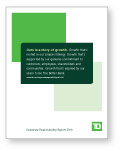Our Stakeholders
-
A credible corporate responsibility approach must include ongoing relations with primary stakeholders. When identifying community and diversity organizations to work with, we select those that align closely with our areas of focus.
We offer a variety of ways for stakeholders to contact us and let us know their needs and concerns. We actively maintain various channels of communication to learn what we are doing well and where we need to improve. The table below lists key issues in 2010, some raised by our stakeholders and other concerns that we identified and sought their input on.
Stakeholders Issues Ways We Interact 2010 Key Results Customers - Help for low-income customers
- Customer satisfaction
- Lack of savings
- Interest in renewable energy
- Customer satisfaction surveys by phone, online, e-mail and focus groups
- Mechanism for handling complaints
- TD Ombudsman
- Consumer associations
- Environmental tracker surveys
- Number of customers supported through TD Helps
- Customer Experience Index
- Get Saving campaign
- Launch of renewable energy products and information guides
Employees - Increased expectations for flexible work options
- Paper usage
- Employee satisfaction surveys
- Focus groups and HR meetings
- Workplace health and safety committees
- Intranet comment engine
- Employee Ombudsman
- Improved U.S. Employee Engagement scores
- Enhanced wellness options
- Go Paperless Challenge
Shareholders and Investors - TD’s growth strategy and risk appetite in a challenging economic and regulatory environment
- Annual General Meeting
- Shareholder resolutions
- Periodic meetings with investors on results and risk management
- Dedicated website for Investor Relations
- E-mail, phone calls, surveys and perception study
- Leadership videos
- Investor days and sessions
- Quarterly finance reports
- Annual General Meeting
- Wealth investor session
- U.S. Investor Day
- 15 investor conference presentations
Suppliers - Registering interest as a prospective supplier
- E-mail address, monitored by Strategic Sourcing, available on td.com
- Enhanced online information for prospective suppliers
Industry Associations - Global discussion of the capital and liquidity requirements for Financial Institutions
- Review of legislation governing Financial Institutions
- Continued business in a resource constrained economy
- Industry association memberships, such as the Canadian Bankers Association
- Memberships with various multi-stakeholder groups
- Contributed to the global discussion on banking regulations
- Provided submission to the Canadian government on banking regulations
- TD’s participation in Greening Greater Toronto
Educational Institutions - Development of a skilled workforce
- Access to education for underserved and diverse communities
- Support for universities
- Joint initiatives to promote access to education
- Donations to post-secondary institutions
- Back to Work Program
Government - Safety and soundness of the global banking sector
- Promotion of Toronto as a Financial Services hub
- Government Relations team for Canada and the U.S.
- Ongoing dialogue with regulators and policy makers
- Provided input on the code of conduct for the debit and credit card industry
- TD is a member of the Toronto Financial Services Alliance, and became a primary sponsor of the Global Risk Initiative
Communities - Reduced government grants and funding
- Lack of core funding for operations
- Finding core skills on a volunteer basis
- Need for financial literacy training
- Community Relations team for Canada, U.S. and the U.K.
- Meetings, phone calls, e-mails and focus groups
- Dedicated website for some community programs
- TD Friends of the Environment Foundation chapters
- Increased community giving
- Increased employee volunteering
- Funded the Canadian Centre for Financial Literacy
Non-Governmental Organizations (NGOs) - Financing and investing in resource sectors
- Environmental and social impacts to Aboriginal Peoples
- Open-door policy
- Meetings, phone calls and face-to-face consultation
- Funding research projects
- Conferences and forums
- Promoting environmental dialogue


